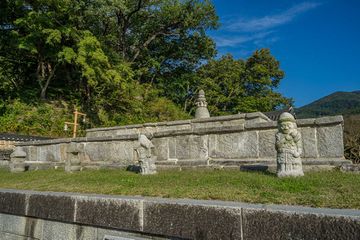"김제 금산사 금강계단"의 두 판 사이의 차이
(새 문서: {{진행중}} {{문화유산정보 |사진=김제금산사금강계단.jpg |사진출처=한국학중앙연구원 디지털인문학연구소. |대표명칭=김제 금산사 금강계...) |
(→영문) |
||
| 33번째 줄: | 33번째 줄: | ||
'''Ordination Platform of Geumsansa Temple, Gimje''' | '''Ordination Platform of Geumsansa Temple, Gimje''' | ||
| + | An ordination platform is a place where a public ordination ceremony wherein a lay follower of Buddhism formally vows to uphold the five precepts given by the Buddha. In the center of this platform there is a stupa* where the relics (or remains) of the Buddha are enshrined. It symbolizes the eternal presence of Buddha (in this place). | ||
| + | |||
| + | Geumsansa Temple is a center of the cult of Maitreya (the Buddha of the Future). Therefore this ordination platform is said to represent the Tusita (Dosolcheon in Korean), which is the fourth of the six heavenly realms in Buddhist cosmology. It is said that Maitreya Bodhisattva is currently residing in this heaven, awaiting his own rebirth to become a Buddha. | ||
| + | |||
| + | The platform was built by the Buddhist monk Jinpyo in 762, and since underwent several repairs. Each side of the two-tiered square base is carved in relief with images of buddhas and guardian deities. Judging from the remaining stone pillars standing near the bottom tier of the base, the platform was originally surrounded by a stone railing. | ||
| + | |||
| + | The center stupa is presumed to have been made in the Goryeo period (918-1392). Four corners of the foundation stone are each carved in a shape of a lion’s head. The top part of the stupa rests on stone carving of nine dragon heads. | ||
| + | |||
| + | Among ordinary platforms enshrining the remains of the Buddha in Korea, this monument is thought to have been preserved the best, which makes it a particularly valuable (cultural) heritage. | ||
| + | |||
| + | |||
| + | * should I call it a stupa (for its shape) of a pagoda (for its function?) | ||
===영문 해설 내용=== | ===영문 해설 내용=== | ||
2020년 3월 2일 (월) 22:12 판
| 김제 금산사 금강계단 Ordination Platform of Geumsansa Temple, Gimje |
|
| 대표명칭 | 김제 금산사 금강계단 |
|---|---|
| 영문명칭 | Ordination Platform of Geumsansa Temple, Gimje |
| 한자 | 金堤 金山寺 金剛戒壇 |
| 주소 | 전라북도 김제시 금산면 모악15길 1 |
| 지정번호 | 보물 제26호 |
| 지정일 | 1963년 1월 21일 |
| 분류 | 유적건조물/종교신앙/불교/기타 |
| 시대 | 고려시대 |
| 수량/면적 | 1기 |
| 웹사이트 | 김제 금산사 금강계단, 국가문화유산포털, 문화재청. |
|
|
|
해설문
국문
통일신라 경덕왕 21년(762)에 진표율사가 최초로 설치하였고, 이후 점차적으로 보완되어 고려 혜덕왕사 소현이 중창하였다. 한 중앙 종모양의 탑 안에 부처님의 진신사리가 모셔져 있다. 출가자와 재가자의 수계* 의식이 행해졌으며, 특히 미륵십선계를 주었던 방등계단이다.
미륵전은 미륵하생신앙, 방등계단은 미륵상생신앙을 상징하는 도솔천을 표현하였다. 기단의 각 면에는 고려시대의 수려한 기법이 잘 표현되어 있는 불상과 신장상이 조각되어 있다. 사리탑 형식의 계단으로 우리나라에서 가장 완벽한 형태를 갖춘 희귀하고 중요한 성보문화재로 평가받고 있다.
- 수계(受戒): 부처님의 가르침을 믿고 따르는 사람이 반드시 지켜야 할 계율을 받는 의식
영문
Ordination Platform of Geumsansa Temple, Gimje
An ordination platform is a place where a public ordination ceremony wherein a lay follower of Buddhism formally vows to uphold the five precepts given by the Buddha. In the center of this platform there is a stupa* where the relics (or remains) of the Buddha are enshrined. It symbolizes the eternal presence of Buddha (in this place).
Geumsansa Temple is a center of the cult of Maitreya (the Buddha of the Future). Therefore this ordination platform is said to represent the Tusita (Dosolcheon in Korean), which is the fourth of the six heavenly realms in Buddhist cosmology. It is said that Maitreya Bodhisattva is currently residing in this heaven, awaiting his own rebirth to become a Buddha.
The platform was built by the Buddhist monk Jinpyo in 762, and since underwent several repairs. Each side of the two-tiered square base is carved in relief with images of buddhas and guardian deities. Judging from the remaining stone pillars standing near the bottom tier of the base, the platform was originally surrounded by a stone railing.
The center stupa is presumed to have been made in the Goryeo period (918-1392). Four corners of the foundation stone are each carved in a shape of a lion’s head. The top part of the stupa rests on stone carving of nine dragon heads.
Among ordinary platforms enshrining the remains of the Buddha in Korea, this monument is thought to have been preserved the best, which makes it a particularly valuable (cultural) heritage.
- should I call it a stupa (for its shape) of a pagoda (for its function?)
영문 해설 내용
이곳은 부처님이 정한 계율에 따를 것을 서약하는 수계(受戒) 의식을 행했던 장소이다. 중앙에 부처님의 사리를 모신 종 모양의 탑이 있으며, 부처님이 늘 이곳에 계신다는 것을 상징한다.
금산사가 미륵신앙의 중심지이기 때문에, 이 계단은 불교에서 말하는 제4천인 도솔천을 나타내기도 한다. 미륵신앙에 따르면, 미륵은 도솔천에 머물면서 성불할 때를 기다리고 있다고 한다.
762년에 진표율사가 최초로 설치하였고, 이후 여러 차례 중수되었다. 2단으로 정사각형의 기단을 만들고, 기단의 각 면에 불상과 신장상을 새겼다. 아래층 기단 주위에 돌기둥이 세워져 있는 것으로 보아 원래 난간을 둘렀던 것으로 추정된다.
중앙의 탑은 고려시대에 만들어진 것으로 보인다. 받침돌의 네 귀퉁이에는 사자 머리를 새겼고, 탑 꼭대기에는 9개의 용머리 조각으로 장식했다.
한국에 남아있는 사리탑 형식의 계단 중 가장 완벽한 형태를 보존하고 있는 매우 중요한 문화재이다.
- 도솔천 관련 언급은 고창 선운사 도솔암 내원궁 참고.
- 수계와 관련해서는 Buddhist initiation ritual 참고.
참고
- "전북 김제 금산사", 김휴림의 엽서, 네이버 포스트, 2018.09.13.
